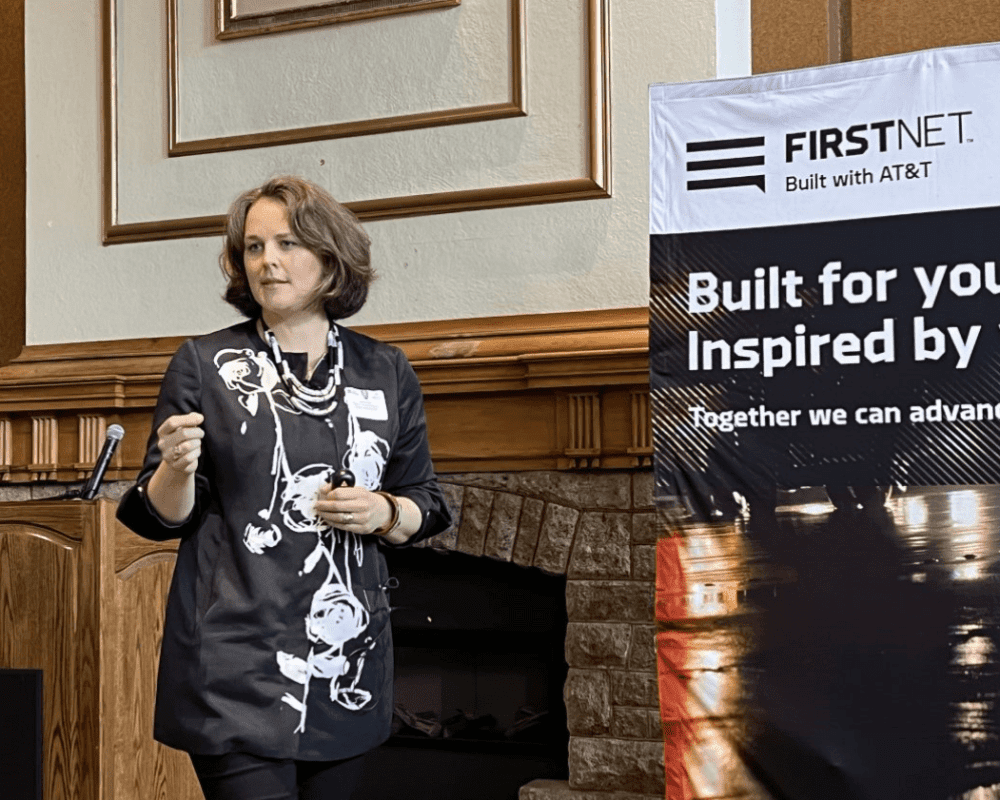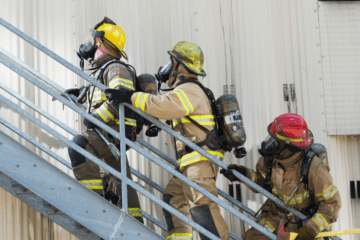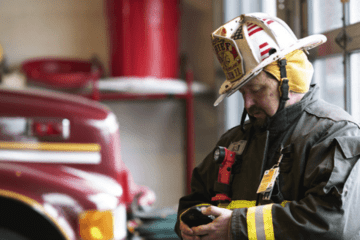 In honor of Mental Health Awareness month this May, we’re highlighting the sacrifices made by first responders – on and off the job. Given this hard work and sacrifice, we owe it to first responders to provide them with the resources to stay physically and mentally well.
In honor of Mental Health Awareness month this May, we’re highlighting the sacrifices made by first responders – on and off the job. Given this hard work and sacrifice, we owe it to first responders to provide them with the resources to stay physically and mentally well.
As we shine a light on our first responders and highlight the work FirstNet, Built with AT&T is doing to support them, we spoke with Dr. Anna Fitch Courie, the Director of Responder Wellness for the FirstNet Program at AT&T.
What brought you to your current role with FirstNet and what are your primary responsibilities?
Nursing is the art and science of caring for individuals and populations wherever they are on their health journey. My passion for people, their wellness and their health are what brought me to the FirstNet program. As an Army wife, Navy Brat and former ICU nurse, the opportunity to serve and care for those who serve is an honor.
I lead AT&T’s commitment to First Responder Health and Wellness. I am responsible for creating, developing and implementing FirstNet strategies, campaigns and programs that will advance first responder health and wellness.
As a part of this effort, we established the FirstNet Health and Wellness Coalition that brought together the C-suite leadership of over 20 national public safety organizations, representing over 5.1 million first responders to address the most pressing public safety wellness needs.
 What drives your passion for the mental health and wellbeing of our country’s first responders?
What drives your passion for the mental health and wellbeing of our country’s first responders?
My dad suffered a traumatic brain injury (TBI) during his time in the Navy from a training accident. It led to acute and significant mental health issues. It is incredibly difficult to watch someone suffer from mental health issues. It’s not just mental pain they suffer, but physical. And it never just affects the individual, but also friends and family who feel powerless to “fix” a problem that it so difficult to pinpoint. And we don’t talk about the problem. It’s awkward. Difficult. Uncomfortable. But I believe change happens we do awkward, difficult and uncomfortable things.
I also believe that through struggle, we can grow. Trauma and adversity have been woven through the very fabric of history. One Army General challenged me long ago when facing a deployment during OEF to support the spouses, “how do we face this and come out of it stronger?” That’s kind of been my mantra when faced with just about anything. It doesn’t mean it doesn’t hurt, it doesn’t mean the trauma goes away, it doesn’t mean we can fix it, but it does look at adversity through the lens of growth. If FirstNet can help public safety face difficult things and come out stronger, then I think that’s an awesome vision for the future.
Can you talk to us about your firsthand experience with first responder mental health and how important providing support is?
I’ll confess. I definitely fall into the “compartmentalization” mantra in my career. There are several patients that I remember to this day. And they are all dead for different reasons. They’ve stayed with me.
The old guard nursing way of dealing with dying patients or traumatic issues was to go smoke. My experience with public safety, is a lot of time they go drink—or isolate themselves—or practice other risky behaviors. Nurses, we smoked. None of these behaviors are healthy responses or healthy ways of addressing the elephant in the room of a patient or community member dying or not being saved. When we are called to help someone, and they die, it’s easy to feel a sense of failure. No one likes to fail, and it can stick with you.
But I learned that sometimes things happen. There were things that I couldn’t save or fix. But I could care for them. I could enter into that special place and despite the ugliness of what they were dealing with, the goodbyes to family, the traumatic ends of their lives, I could still care. Drs. Trzeciak and Mazarelli challenge us in their book “Compassionomics” that there is scientific evidence that caring really makes a difference.
I think that caring makes a big difference in life. I think that teaching people how to have a language about trauma makes a difference. I think that teaching people about the resources and the actions and the steps that they as individuals can take to make change in their personal lives is really important. When we provide support and resources, that’s how we show we care and that makes a difference in peoples’ lives.
How is the FirstNet Health and Wellness Coalition supporting first responders on and off the job?
The mission of the FirstNet Health and Wellness Coalition is to integrate responder, community, industry and academic capabilities in order to support the health, wellness and readiness of American First Responders.
Priorities include posttraumatic stress, depression, self-harm, physical fitness, responder resiliency, stress management and leadership engagement
There are five major lines of business for the program (Weave Health and Wellness through all aspects of the FirstNet mission):
- Engage our stake holders (FirstNet Health and Wellness Coalition)
- Prioritize our efforts (First Responder Needs Assessment)
- Curate Health and Wellness Applications into the FirstNet Ecosystem
- Integrate Health and Wellness Into our Strategic Messaging
- Support Target Programs and initiatives that address our key priorities
I think of wellness as bringing technical, programmatic and collaborative solutions to wherever responders live, work or play. Wellness is really about integrating activities, habits, actions, lessons learned and caring and purposes into every aspect of life. Our solutions are driving towards this goal.
What are your goals for this program and overall first responder wellness in the future?
FirstNet Health and Wellness is growing in leaps and bounds. I want FirstNet to be synonymous with public safety infrastructure: from before the disaster happens, FirstNet provides connectivity; during the disaster FirstNet provides and deploys connectivity; after the disaster, FirstNet ensures connectivity. I see the wellness program the same way: weaving health and wellness capabilities throughout all stages of the deployment cycle: before, during and after disaster, we support public safety because they support us. It’s an honor to serve those who serve. My goal is to continue to do so and each and every day, responders feel that care.
To learn more about first responder mental health and wellness, check out Dr. Courie’s recent op-ed in the New Hampshire Union Leader, co-authored by Robert L. Quinn, Commissioner of the New Hampshire Department of Safety.





